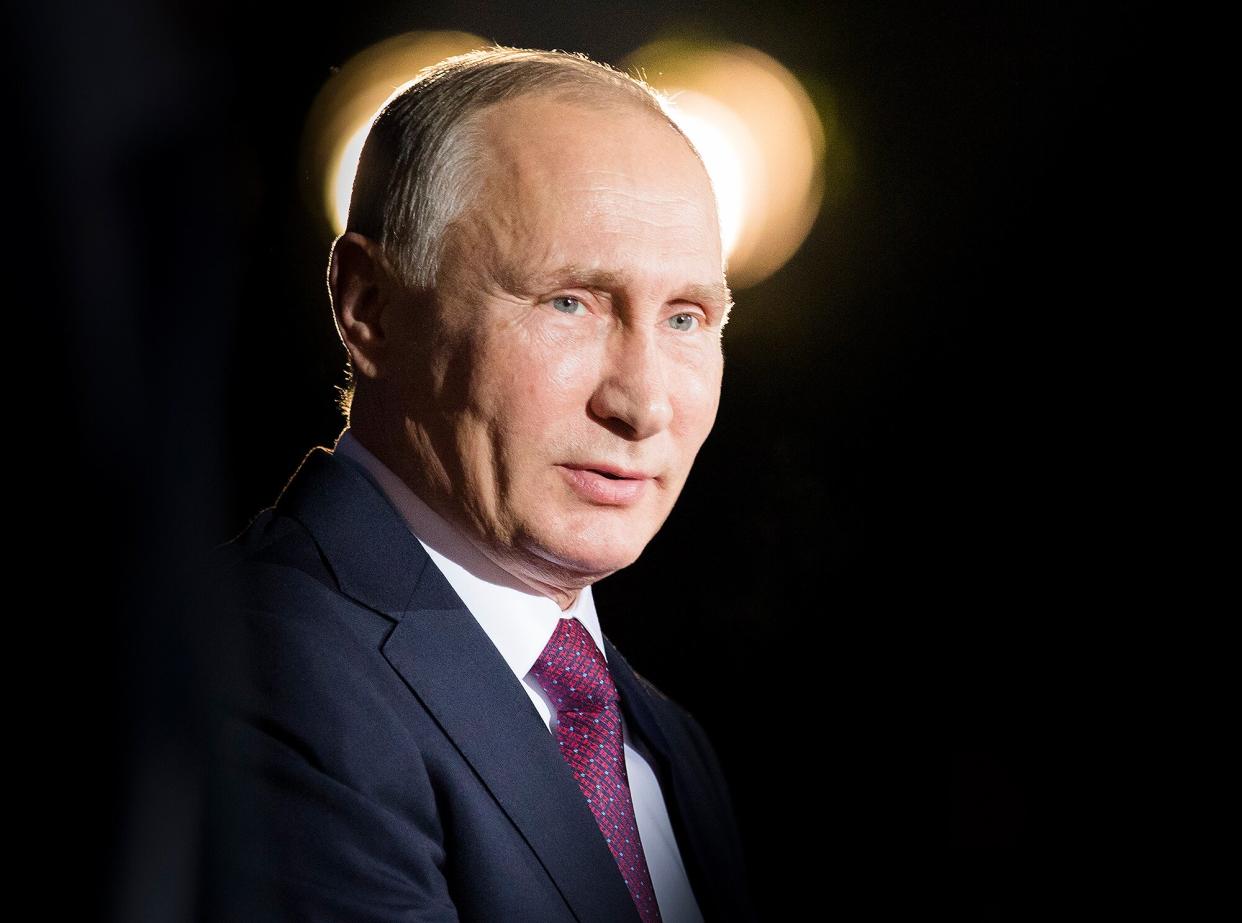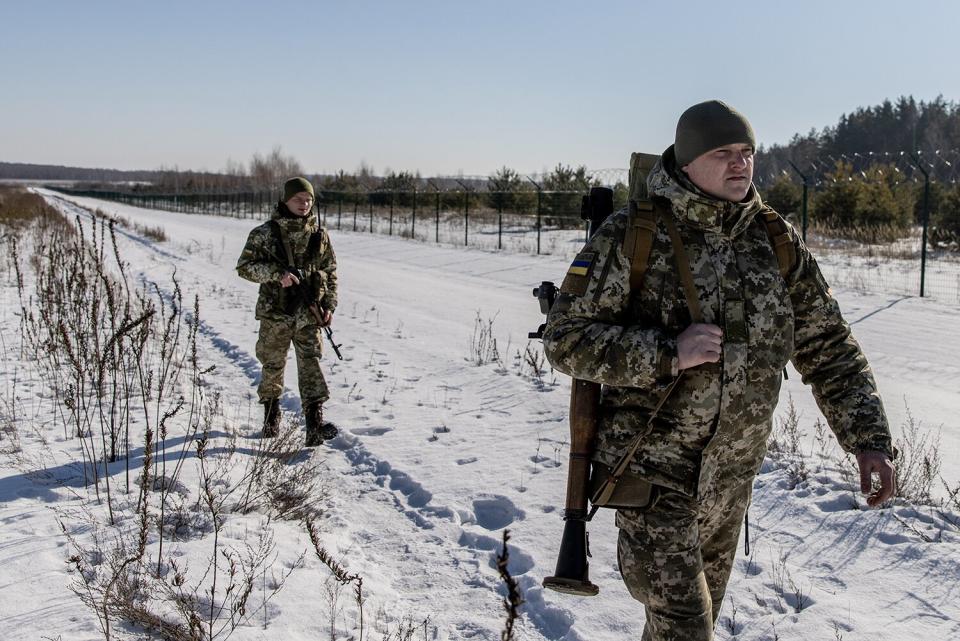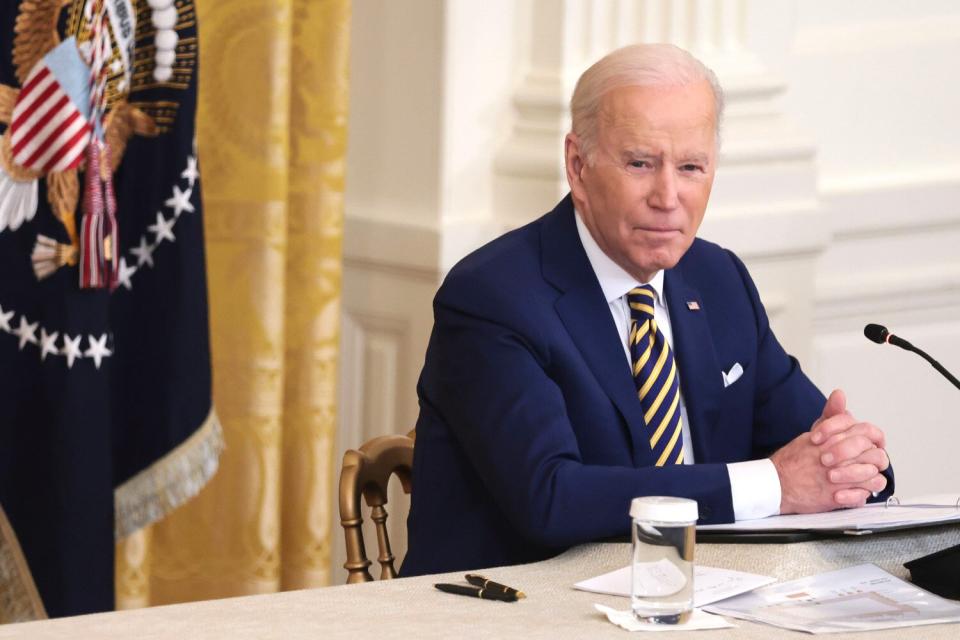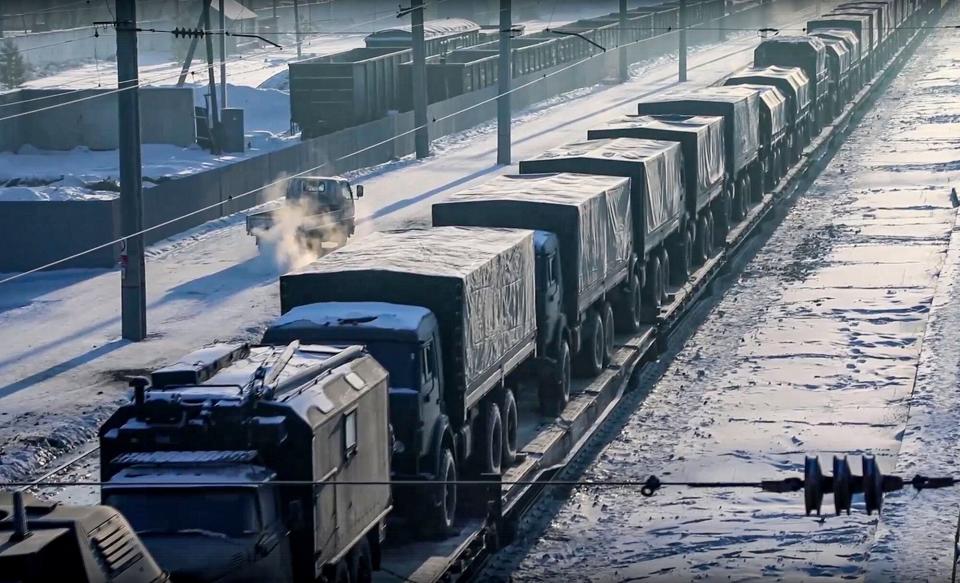What's Next in Russia's Apparent Ukraine Invasion? How Putin Might Fight, How U.S. Response Could Affect You

- Oops!Something went wrong.Please try again later.
- Oops!Something went wrong.Please try again later.
Florian Gaertner/Photothek via Getty Vladimir Putin
As the U.S. labels Vladimir Putin's latest moves in the Ukraine crisis the start of an "invasion," Europe is closer to the brink of war with more than 100,000 Russian troops positioned along the country's vast border with its neighbor.
On Monday, Putin declared two separatist territories in Ukraine, Donetsk and Luhansk, independent states and ordered Russian troops to deploy on a so-called "peacekeeping mission" in the country's eastern region, which he called "ancient Russian lands."
U.S. President Joe Biden called that a "flagrant violation of international law" that "commands a firm response from the international community" in a speech on Tuesday.
For more on the invasion of Ukraine, listen below to our daily podcast on PEOPLE Every Day.
Ukrainian President Volodymyr Zelenskyy also said Tuesday that Russia has violated his country's "national integrity and sovereignty" and that the borders will "remain as such," CNN reported.
The scale of an attack by Russia and precisely how NATO will respond as it unfolds in the coming days, weeks and months — or even whether the block of western allies can remain in lockstep for the long run if full-scale war breaks out over Ukraine — remain to be seen.
RELATED: Russia's Latest Aggression in Ukraine Crisis Is 'Beginning of an Invasion,' U.S. Says
Will people die and on what scale? Will American troops fight within Ukraine's now-disputed borders? How could war impact the world and U.S. economies?
What War Might Look Like
More than 150,000 Russian troops are currently stationed along the country's border with Ukraine. U.S. intelligence determined that this makes up close to 75 percent of Russia's principal combat units but still less than half of all troops in the country's armed forces.
U.S. Secretary of Defense Lloyd Austin said last week that Russia was also flying in more combat and support aircraft, working to "sharpen their readiness in the Black Sea" and "stocking up their blood supplies," CNN reported, signaling the fear that war could breakout on the ground, in the air and by sea.
"Our information indicates clearly that these forces, including ground troops, aircraft, ships are preparing to launch an attack against Ukraine in the coming days," Austin said.
President Biden said last week that the U.S. believes Russia "will target Ukraine's capital, Kyiv, a city of 2.8 million innocent people."
He and the U.S. State Department also issued warnings last week, telling American citizens in Ukraine to "leave now" over fears of an invasion and the impossibility of rescuing stragglers from Ukraine if it comes under attack or occupation by Russia.
"It's not like we're dealing with a terrorist organization. We're dealing with one of the largest armies in the world," Biden said of a potential invasion. "It's a very different situation, and things could go crazy quickly."

Chris McGrath/Getty
The State Department said crime, civil unrest and combat operations are all possible and told American citizens that no part of Ukraine was safe. U.S. diplomats were told to leave their posts in Kyiv as the American embassy suspends consular services at in the capital but will maintain a smaller presence in Lviv, a city in western Ukraine close to the Polish border.
This appears to indicate that the Ukrainian capital in the middle of the country is in the crosshairs, despite the focus of Putin's decree on eastern territories.
"You're looking at not just an invasion through the east through the Donbas, but according to the intelligence we are seeing, coming down from the north, down from Belarus and actually encircling Kyiv itself," U.K. Prime Minister Boris Johnson told reporters Saturday.
Even if military action is limited to Donbas, the region that includes Donetsk and Luhansk, it could be intense. More than 14,000 people have died since fighting began there in 2014 between pro-Russian separatists and others loyal to Ukraine. Another 2 million have fled the violence and economic ruin that's plagued the territories in recent years.
In January, a Pentagon spokesman said up to 8,500 U.S. troops were put on heightened alert for a possible deployment to NATO allies in Eastern Europe and the Baltics, which would include warships and aircraft.
"The United States has taken steps to heighten the readiness of its forces at home and abroad, so they are prepared to respond to a range of contingencies, including support to the NATO response force if it is activated," Department of Defense Press Secretary John Kirby said, adding that the NATO Response Force "comprises around 40,000 multinational troops."
But Biden has vowed to keep American ground troops out of possible fighting in Ukraine, saying Friday that the option is "not on the table."

Shutterstock
"The United States and our Allies are prepared to defend every inch of NATO territory from any threat to our collective security as well," Biden said. "We also will not send troops in to fight in Ukraine, but we will continue to support the Ukrainian people."
Even when asked about a letter the U.S. sent to the United Nations, claiming Moscow has lists of Ukrainians "to be killed or sent to camps following a military occupation," a senior Biden administration official said Monday that the president has "no intention of sending American forces to fight inside Ukraine."
Economic Disruption
On Tuesday, Biden said his administration will impose new sanctions on Russia that have been "closely coordinated with our allies and partners" and will go "far beyond" steps implemented in 2014.
The new measures come after the administration banned American economic activity in the disputed Donetsk People's Republic and Luhansk People's Republic, and Germany announced that it will halt the certification of Nord Stream 2, a major natural gas pipeline that links the country with Russia via the Baltic Sea, in response to Putin's decree and decision to move troops into Ukraine.
"If Russia goes further with this invasion, we stand prepared to go further with sanctions," Biden said before describing the "first tranche" of measures, which target Russian financial institutions, its sovereign debt and the country's elites and their family members.
"We've cut off Russia's government from western financing," he said, adding that Russian elites, "share in the corrupt gains of the Kremlin policies and should share in the pains as well."
In his remarks, Biden acknowledged that some of the economic sanctions could impact Americans.
RELATED: President Biden and State Department Tell Americans in Ukraine to Leave Now: 'Things Could Go Crazy'
"President Biden is keenly aware that one of his biggest liabilities right now is inflation, the cost of living being at a 40-year high," CBS News' Margaret Brennan told PEOPLE of the president's thinking as he announces sanctions against Russia. "The first things to react to a crisis like this are the oil and gas markets and that there could be further supply chain issues that result from a conflict in the middle of Europe."

RUSSIAN DEFENCE MINISTRY PRESS SERVICE/HANDOUT/EPA-EFE/Shutterstock
Biden said his administration will use "every tool at our disposal to protect businesses and consumers from rising prices at the pump."
More broadly, unanswered questions about what Russia will do and how far it will go towards war have the potential to spoil recent American economic gains.
"It's really bad for the economy and for the markets when there is uncertainty," Brennan said. "We are already in this recovery of constantly starting and stopping when it comes to COVID. You have uncertainty on that front. Now we have the uncertainty of geopolitical risk. Where does Vladimir Putin stop? Does this spill over into Poland or Romania or Lithuania, countries that the United States would be required to help militarily defend? That question of just how far it goes makes big companies and big investors move a little bit more slowly or be more calculated in their decisions. All of that can potentially cause economic problems."
In his remarks, Biden promised to take "robust action so that the pain of our sanctions is targeted at the Russian economy and not ours."
However, he conceded that "defending freedom will have costs for us as well here at home," and added, "We need to be honest about that."

